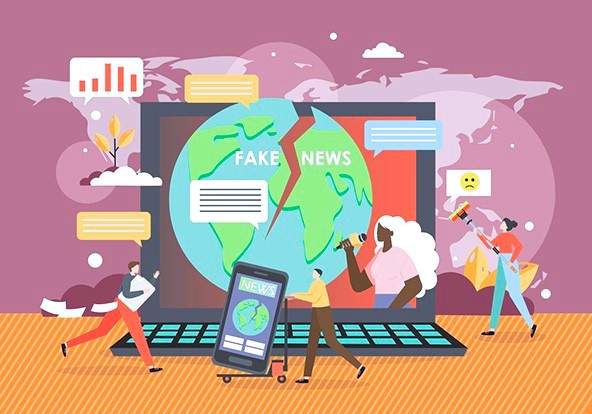In an era where information flows abundantly from various sources, media literacy has emerged as a crucial skill for individuals to navigate the complexities of the Information Age. The ability to critically analyze, interpret, and create media content is paramount in fostering a well-informed and discerning society. This article delves into the significance of media literacy, its key components, and the role it plays in shaping informed citizens in the contemporary digital landscape.
Understanding Media Literacy:
Media literacy goes beyond the ability to read and write; it encompasses the capacity to analyze, evaluate, and create media messages across various platforms. In the Information Age, where information is disseminated rapidly through digital channels, media literacy is a tool that equips individuals with the skills to navigate a complex and ever-changing media landscape.
Key Components of Media Literacy:

- Critical Thinking: At the heart of media literacy is critical thinking. Individuals need to question information, assess its credibility, and discern potential biases. Critical thinking enables individuals to look beyond surface-level content and delve into the underlying messages and motivations.
- Digital Literacy: In the digital age, media is predominantly consumed online. Digital literacy involves the ability to use technology effectively, understand digital platforms, and critically evaluate online content. This includes recognizing fake news, understanding algorithms, and being aware of online privacy and security issues.
- Analyzing Media Messages: Media literacy involves dissecting media messages to understand their purpose, target audience, and potential impact. This includes examining the use of language, visuals, and framing to identify the underlying intentions of media content.
- Media Creation Skills: Media literacy is not only about consumption but also about creation. Individuals should be equipped with the skills to produce media content responsibly. This includes understanding the ethical considerations of media creation, such as accuracy, fairness, and respect for diverse perspectives.
The Importance of Media Literacy in the Information Age:
- Combatting Misinformation: In an age of information overload, misinformation and fake news abound. Media literacy empowers individuals to differentiate between reliable and unreliable sources, identify misleading narratives, and fact-check information.
- Empowering Critical Consumers: Media literacy transforms individuals from passive consumers to critical thinkers. By understanding the techniques used in media manipulation, individuals become less susceptible to manipulation and are better equipped to make informed decisions.
- Fostering Informed Citizenship: Media literacy is essential for fostering an informed and engaged citizenry. In democratic societies, where informed decision-making is paramount, media-literate citizens contribute to a healthier and more vibrant democracy.
- Promoting Cultural Understanding: Media literacy encourages individuals to engage with diverse perspectives and question cultural representations in media. This promotes cultural understanding, tolerance, and empathy, fostering a more inclusive society. Read our article about the psychology of media consumption: understanding audience behavior.
Educational Initiatives in Media Literacy:
- Incorporating Media Literacy in Curricula: Educational institutions play a pivotal role in fostering media literacy. Integrating media literacy into school curricula ensures that students develop these skills from an early age, preparing them for the challenges of the Information Age.
- Teacher Training Programs: Educators themselves need to be well-versed in media literacy to effectively impart these skills to students. Teacher training programs that focus on media literacy equip educators with the knowledge and tools to nurture media-literate students.
- Community Workshops and Outreach: Media literacy extends beyond classrooms. Community workshops and outreach programs engage the broader public, providing practical tools and resources for individuals to enhance their media literacy skills.
Standardization in Media Literacy:
To ensure a consistent and comprehensive approach to media literacy, standards play a crucial role. Wikipedia’s article on Media Literacy provides insights into global standards and practices, offering a comprehensive overview of the principles guiding media literacy education. Additionally, Canada.ca serves as a resource for understanding Canadian regulations and standards in education.
Challenges and Future Considerations:

- Rapid Technological Advancements: The pace of technological advancements poses a challenge to media literacy education. Constant updates in digital platforms and technologies require ongoing adaptation of media literacy curricula.
- Addressing Digital Inequalities: Ensuring equitable access to digital resources is crucial for effective media literacy education. Efforts should be made to address digital inequalities and provide equal opportunities for all individuals to develop media literacy skills.
- Global Collaboration: As information transcends borders, global collaboration is essential to address the challenges of misinformation and promote media literacy on a broader scale. International cooperation can contribute to the development of best practices and standards.
Conclusion:
In the Information Age, where media permeates every aspect of our lives, media literacy is not just a desirable skill but a necessity. It empowers individuals to navigate the digital landscape with discernment, fostering critical thinking and informed decision-making. Educational institutions, communities, and governments all play a role in promoting media literacy, ensuring that individuals are equipped to engage with media content responsibly. By embracing media literacy, societies can create a more resilient and well-informed citizenry, capable of navigating the complexities of the Information Age with critical eyes.




